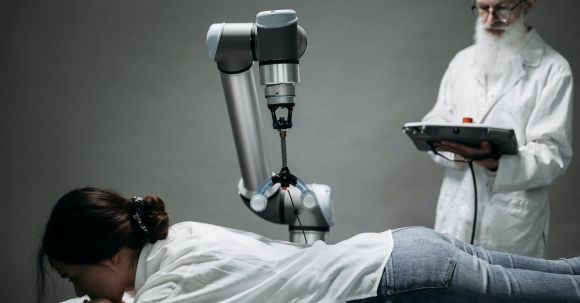Artificial intelligence (AI) has emerged as a groundbreaking technology with vast potential in various industries. One area where AI has been particularly transformative is healthcare. With its ability to analyze massive amounts of data and make accurate predictions, AI is revolutionizing the way healthcare professionals diagnose and treat diseases. In this article, we will explore the transformative power of AI in healthcare and the ways it is reshaping the future of medicine.
Enhanced Diagnosis and Treatment
One of the key benefits of AI in healthcare is its ability to enhance the accuracy and speed of diagnosis. By analyzing medical images, AI algorithms can quickly identify abnormalities and assist doctors in making more accurate diagnoses. This not only saves time but also reduces the risk of misdiagnosis, ultimately leading to better patient outcomes.
Moreover, AI-powered systems can also suggest personalized treatment plans based on an individual’s medical history, genetic makeup, and other relevant factors. This personalized approach helps healthcare professionals deliver targeted and effective treatments, improving patient care and reducing the incidence of adverse reactions.
Streamlined Administrative Processes
AI has also proven to be a game-changer in streamlining administrative processes in healthcare. Tasks such as medical coding, billing, and record-keeping are traditionally time-consuming and prone to errors. However, AI-powered systems can automate these processes, reducing paperwork and freeing up healthcare professionals to focus on patient care.
By automating administrative tasks, AI not only improves efficiency but also reduces costs associated with manual labor. This allows healthcare organizations to allocate their resources more effectively, resulting in better overall healthcare delivery.
Improved Patient Monitoring
Another area where AI is making a significant impact is in patient monitoring. AI-powered devices can continuously monitor vital signs, such as heart rate, blood pressure, and respiratory rate, in real-time. This continuous monitoring enables early detection of any deviations from the normal range, allowing healthcare professionals to intervene promptly and prevent complications.
Furthermore, AI algorithms can analyze patient data and identify patterns that may indicate the onset of a particular condition. For example, in patients with chronic diseases like diabetes, AI can detect trends in blood sugar levels and provide timely recommendations for lifestyle modifications or medication adjustments. This proactive approach to patient monitoring can significantly improve outcomes and reduce hospital admissions.
Ethical Considerations
While the transformative power of AI in healthcare is undeniable, it also raises important ethical considerations. For instance, the use of AI in decision-making processes may raise concerns about the potential for bias or discrimination. Healthcare organizations must ensure that AI algorithms are developed and tested using diverse datasets to avoid perpetuating existing inequalities in healthcare.
Additionally, the use of AI in healthcare requires careful consideration of patient privacy and data security. As AI systems rely on vast amounts of patient data, it is crucial to establish robust safeguards to protect patient confidentiality and prevent unauthorized access.
The Future of AI in Healthcare
Looking ahead, the future of AI in healthcare holds immense potential. As technology continues to advance, we can expect even more sophisticated AI algorithms that can predict disease progression and treatment outcomes with higher accuracy. AI-powered virtual assistants and chatbots are also likely to play a more prominent role in patient interactions, providing personalized healthcare advice and support.
In conclusion, the transformative power of AI in healthcare is reshaping the future of medicine. From enhanced diagnosis and treatment to streamlined administrative processes and improved patient monitoring, AI is revolutionizing healthcare delivery. However, as we embrace the potential of AI, it is crucial to address the ethical considerations and ensure that this powerful technology is used responsibly to benefit all patients. With careful implementation and ongoing innovation, AI has the potential to revolutionize healthcare and improve patient outcomes on a global scale.
